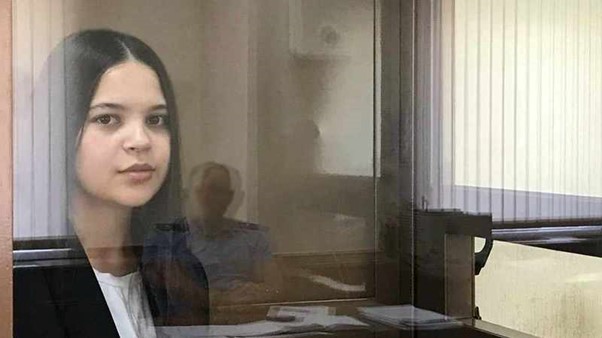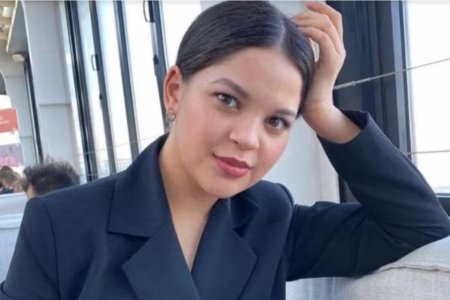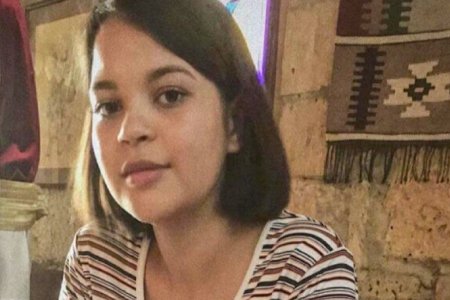
It is over a year since Leniye Umerova was first taken prisoner as she tried to reach occupied Crimea to visit her gravely ill father. If Russia’s FSB has decided how to embellish the ‘spying’ charge laid after five months of imprisonment, they are still not letting on, yet the Lefortovo court in Moscow on 18 October once again extended her detention until 4 March.
After the hearing, Leniye’s lawyer Dmitry Dinze told For Human Rights that there is no new information from the ‘investigators’, and it is not known whether any ‘investigative measures’ are being carried out. “Everything is secret”.
Spying charges are, doubtless, a favourite for Russia’s FSB precisely because a person can be arrested, imprisoned and then sentenced to up to 20 years without any real information as to what they were charged with. Such charges have been laid against Ukrainian nationals since 2014, with the number significantly increasing in 2022 since Russia began looking for an excuse to justify its abduction and imprisonment of civilian hostages from occupied Ukrainian territory. Those detained are generally held incommunicado, and often denied access to independent lawyers. Leniye Umerova fortunately does have a lawyer, and a very good one, but he has been forced, under pain of criminal charges, to sign a non-disclosure undertaking.
In a recent interview to Crimean Realities, Leniye’s brother Aziz Umerov said that the spying charge had been expected. It had been clear after excuse after excuse was used to keep her imprisoned on administrative charges that the FSB were planning to bring serious charges. “It could have been extremism, terrorism or, as it transpired, spying”.
“We believe that this is an act of revenge for her civic position which she demonstrated in 2014 by refusing, as a person from Crimea, to take Russian citizenship. In the entire coach crossing the border [from Georgia into Russia], my sister was the only person who didn’t have a Russian passport. That was the main reason why she was detained.”
As reported, Leniye Umerova was initially detained on 4 December 2022 after she crossed the border between Georgia and Russia, trying to reach occupied Crimea where her father had recently been diagnosed with cancer. Leniye herself had left Crimea in 2015 and obtained her higher education in Kyiv, where she was working as a marketing specialist.
Russia’s full-scale invasion of Ukraine in February 2022 made the journey to occupied Crimea much more difficult, with Leniye forced to travel through Bulgaria and Romania into Georgia. It also made it significantly more dangerous for any Ukrainian national in Russian-occupied Ukraine or in Russia, especially a person who had clearly not supported Russia’s annexation of Crimea.
She was detained while on the Tbilisi – Simferopol coach during the night from 3-4 December 2022 at a checkpoint in Northern Ossetia. She was told this was “for a further check and conversation”. The Russian border guards (who are under the FSB) removed Leniye’s Ukrainian internal document, her passport and her telephone. She was told that the Russian border guards would speak with her the following day, and sent to the Sova Hotel outside the city. She was taken, by taxi, in that direction, but via a road which is off limits to foreigners, where the taxi was duly stopped by traffic police. This was almost certainly a set-up, enabling her first administrative charge of “infringing the rules for crossing the Russian state border (Article 18.1 § 1 of Russia’s code of administrative offences). A local court found her guilty of this and fined her (the fairly small amount of) 2,000 roubles, as well as ordering her deportation. Since there is currently no mechanism for organizing such expulsion, she was simply sent to a temporary holding unit for foreign nationals. Her parents found a lawyer who succeeded in getting the deportation order revoked, with the court even noting that Leniye posed no threat to Russia. All of this meant that there was no requirement for her to be imprisoned in a temporary holding unit.
She was released for around 30 seconds, with unidentified individuals seizing her as she left the holding unit. They put a bag over her head, forced her into their car and took her to a district in Vladikavkaz where she was dumped just in time for a police car to turn up and demand that she come with them to the police station. Her entirely logical attempt to find out why appears to have been used as pretext for accusing her of ‘disobeying the orders of an enforcement officer’, and securing a 15-day term of administrative arrest. As that ended, another pretext was found, then another. There were five administrative arrests in total, with human rights groups sounding the alarm and fearing that the FSB were fabricating charges against the young woman.
On 4 May 2023, Leniye was taken to Moscow where, the following day, she was remanded in custody for two months by ‘judge’ Sergei Ryabtsev from the Lefortovo Court. There was secrecy then, which remains to this day, as to how or when Leniye is supposed to have been engaged in ‘spying’.
Until recently the young woman was held in solitary confinement, with the ‘investigators’ almost certainly hoping to put pressure on her to ‘cooperate’ by admitting to whatever charges they laid. According to her brother, she now has a cellmate. Nothing is known about the latter, however this too may be an FSB ploy. The family very seldom receive letters from Leniye, with this partly due to the time it takes for letters to pass the censor, but probably also part of the systematic attempts to isolate Leniye.
Had there genuinely been grounds for accusing a young Ukrainian citizen who had only just stepped on Russian soil, of ‘spying’, Russia would not have come up with such a wealth of unrelated pretexts to keep Leniye imprisoned.
She is now facing a possible 20-year sentence on ‘top secret’ charges which the FSB took six months to even lay and clearly have no intention of revealing. Publicity is vital.
Please help by informing people in your country about the case and by writing to Leniye! The letters tell her – and her captors – that she is not forgotten. Letters need to be handwritten and in Russian. Please avoid any political subjects or mention of the war (or of the charges against her). If possible, enclose an envelope and some thin paper, as well as your return address.
If Russian is a problem, the following would be fine, maybe with a photo or card. The envelope can be written in Russian or English letters, but do add Leniye’s year of birth (as below).
Привет, Ление!
Желаю Вам здоровья, терпения и успехов в изучении английского языка! Очень надеюсь на скорое освобождение. Простите, что мало пишу – мне трудно писать по-русски, но мы все о Вас помним.
[Dear Leniye, I wish you good health, patience and success with your English studies! I very much hope you will soon be released. I’m sorry that this letter is short – it’s hard for me to write in Russian., but you are not forgotten. ]
Address
111020 Россия, г. Москва, ФКУ СИЗО-2 ул. Лефортовский вал 5.
Умеровой, Ление Резвановне, г.р. 1998
[Or in English
111020 Russia, Moscow SIZO-2, Lefortovsky Val, No. 5
Umerova, Leniye Rezvanovna, b. 1998 ]



